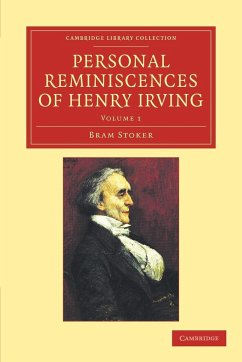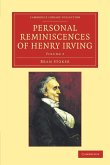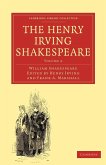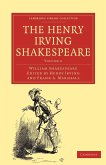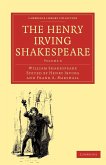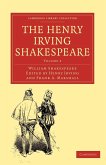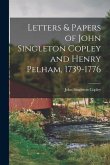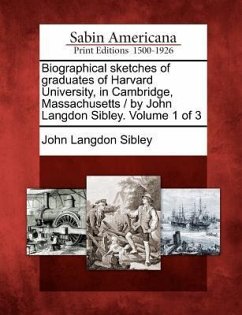Bram Stoker
Personal Reminiscences of Henry Irving
Bram Stoker
Personal Reminiscences of Henry Irving
- Broschiertes Buch
- Merkliste
- Auf die Merkliste
- Bewerten Bewerten
- Teilen
- Produkt teilen
- Produkterinnerung
- Produkterinnerung
An engaging 1906 two-volume tribute to the most famous actor-manager of the nineteenth century by his closest friend and business manager.
Andere Kunden interessierten sich auch für
![Personal Reminiscences of Henry Irving Personal Reminiscences of Henry Irving]() Bram StokerPersonal Reminiscences of Henry Irving45,99 €
Bram StokerPersonal Reminiscences of Henry Irving45,99 €![The Henry Irving Shakespeare The Henry Irving Shakespeare]() William ShakespeareThe Henry Irving Shakespeare44,99 €
William ShakespeareThe Henry Irving Shakespeare44,99 €![The Henry Irving Shakespeare The Henry Irving Shakespeare]() William ShakespeareThe Henry Irving Shakespeare44,99 €
William ShakespeareThe Henry Irving Shakespeare44,99 €![The Henry Irving Shakespeare The Henry Irving Shakespeare]() William ShakespeareThe Henry Irving Shakespeare54,99 €
William ShakespeareThe Henry Irving Shakespeare54,99 €![The Henry Irving Shakespeare The Henry Irving Shakespeare]() William ShakespeareThe Henry Irving Shakespeare44,99 €
William ShakespeareThe Henry Irving Shakespeare44,99 €![Letters & Papers of John Singleton Copley and Henry Pelham, 1739-1776 Letters & Papers of John Singleton Copley and Henry Pelham, 1739-1776]() John Singleton CopleyLetters & Papers of John Singleton Copley and Henry Pelham, 1739-177626,99 €
John Singleton CopleyLetters & Papers of John Singleton Copley and Henry Pelham, 1739-177626,99 €![Biographical sketches of graduates of Harvard University, in Cambridge, Massachusetts / by John Langdon Sibley. Volume 1 of 3 Biographical sketches of graduates of Harvard University, in Cambridge, Massachusetts / by John Langdon Sibley. Volume 1 of 3]() John Langdon SibleyBiographical sketches of graduates of Harvard University, in Cambridge, Massachusetts / by John Langdon Sibley. Volume 1 of 330,99 €
John Langdon SibleyBiographical sketches of graduates of Harvard University, in Cambridge, Massachusetts / by John Langdon Sibley. Volume 1 of 330,99 €-
-
-
An engaging 1906 two-volume tribute to the most famous actor-manager of the nineteenth century by his closest friend and business manager.
Produktdetails
- Produktdetails
- Verlag: Cambridge University Press
- Seitenzahl: 424
- Erscheinungstermin: 11. Januar 2013
- Englisch
- Abmessung: 229mm x 152mm x 25mm
- Gewicht: 685g
- ISBN-13: 9781108057431
- ISBN-10: 1108057438
- Artikelnr.: 39178822
- Herstellerkennzeichnung
- Libri GmbH
- Europaallee 1
- 36244 Bad Hersfeld
- gpsr@libri.de
- Verlag: Cambridge University Press
- Seitenzahl: 424
- Erscheinungstermin: 11. Januar 2013
- Englisch
- Abmessung: 229mm x 152mm x 25mm
- Gewicht: 685g
- ISBN-13: 9781108057431
- ISBN-10: 1108057438
- Artikelnr.: 39178822
- Herstellerkennzeichnung
- Libri GmbH
- Europaallee 1
- 36244 Bad Hersfeld
- gpsr@libri.de
"Bram Stoker, born in Dublin in 1847, overcame a childhood illness to become an accomplished athlete and scholar at Trinity College. His career took a pivotal turn when he became the personal assistant to the famous actor Sir Henry Irving and managed London's Lyceum Theatre for 27 years, immersing himself in high society. While best known for his 1897 novel Dracula, Stoker wrote several other works of gothic fiction. Dracula, in particular, drew on his fascination with folklore and became an iconic influence in vampire literature and popular culture.Stoker's life was shaped by his wide range of interests, including literature, theatre, and travel. His time managing the Lyceum Theatre gave him access to London's literary and artistic circles, where he met figures like Sir Arthur Conan Doyle and Walt Whitman. His travels to places like Whitby, England, and Cruden Bay, Scotland, helped inspire the eerie settings in Dracula. Although he never visited Eastern Europe, Stoker's extensive research into its folklore gave his most famous work a haunting authenticity.In his later years, Stoker faced declining health and financial struggles, yet he remained productive until his death in 1912. Dracula was not initially recognized as a literary masterpiece but has since become one of the most influential horror novels ever written, cementing Stoker's place in literary history. His unique blend of gothic horror, folklore, and Victorian anxieties continues to captivate readers and inspire adaptations across all forms of media."
Preface
1. Earliest recollections of Henry Irving
2. The old school and the new
3. Friendship
4. Honours from Dublin university
5. Converging streams
6. Joining forces
7. The Lyceum productions
8. Irving begins management
9. Shakespeare plays - 1
10. Shakespeare plays - 2
11. Shakespeare plays - 3
12. Shakespeare plays - 4
13. Irving's method
14. Art-sense
15. Stage effects
16. The value of experiment
17. The pulse of the public
18. Tennyson and his plays - 1
19. Tennyson and his plays - 2
20. Tennyson and his plays - 3
21. Tennyson and his plays - 4
22. Waterloo - King Arthur - Don Quixote
23. Art and hazard
24. Vandenhoff
25. Charles Matthews
26. Charles Dickens and Henry Irving
27. Mr J. M. Levy
28. Visits to America
29. William Winter
30. Performance at West Point
31. American reporters
32. Tours-de-force
33. Christmas
34. Irving as a social force
35. Visits of foreign warships
36. Irving's last reception at the Lyceum
37. The voice of England
38. Rival towns
39. Two stories
40. Sir Richard Burton
41. Sir Henry Morton Stanley
42. Arminius Vambéry.
1. Earliest recollections of Henry Irving
2. The old school and the new
3. Friendship
4. Honours from Dublin university
5. Converging streams
6. Joining forces
7. The Lyceum productions
8. Irving begins management
9. Shakespeare plays - 1
10. Shakespeare plays - 2
11. Shakespeare plays - 3
12. Shakespeare plays - 4
13. Irving's method
14. Art-sense
15. Stage effects
16. The value of experiment
17. The pulse of the public
18. Tennyson and his plays - 1
19. Tennyson and his plays - 2
20. Tennyson and his plays - 3
21. Tennyson and his plays - 4
22. Waterloo - King Arthur - Don Quixote
23. Art and hazard
24. Vandenhoff
25. Charles Matthews
26. Charles Dickens and Henry Irving
27. Mr J. M. Levy
28. Visits to America
29. William Winter
30. Performance at West Point
31. American reporters
32. Tours-de-force
33. Christmas
34. Irving as a social force
35. Visits of foreign warships
36. Irving's last reception at the Lyceum
37. The voice of England
38. Rival towns
39. Two stories
40. Sir Richard Burton
41. Sir Henry Morton Stanley
42. Arminius Vambéry.
Preface
1. Earliest recollections of Henry Irving
2. The old school and the new
3. Friendship
4. Honours from Dublin university
5. Converging streams
6. Joining forces
7. The Lyceum productions
8. Irving begins management
9. Shakespeare plays - 1
10. Shakespeare plays - 2
11. Shakespeare plays - 3
12. Shakespeare plays - 4
13. Irving's method
14. Art-sense
15. Stage effects
16. The value of experiment
17. The pulse of the public
18. Tennyson and his plays - 1
19. Tennyson and his plays - 2
20. Tennyson and his plays - 3
21. Tennyson and his plays - 4
22. Waterloo - King Arthur - Don Quixote
23. Art and hazard
24. Vandenhoff
25. Charles Matthews
26. Charles Dickens and Henry Irving
27. Mr J. M. Levy
28. Visits to America
29. William Winter
30. Performance at West Point
31. American reporters
32. Tours-de-force
33. Christmas
34. Irving as a social force
35. Visits of foreign warships
36. Irving's last reception at the Lyceum
37. The voice of England
38. Rival towns
39. Two stories
40. Sir Richard Burton
41. Sir Henry Morton Stanley
42. Arminius Vambéry.
1. Earliest recollections of Henry Irving
2. The old school and the new
3. Friendship
4. Honours from Dublin university
5. Converging streams
6. Joining forces
7. The Lyceum productions
8. Irving begins management
9. Shakespeare plays - 1
10. Shakespeare plays - 2
11. Shakespeare plays - 3
12. Shakespeare plays - 4
13. Irving's method
14. Art-sense
15. Stage effects
16. The value of experiment
17. The pulse of the public
18. Tennyson and his plays - 1
19. Tennyson and his plays - 2
20. Tennyson and his plays - 3
21. Tennyson and his plays - 4
22. Waterloo - King Arthur - Don Quixote
23. Art and hazard
24. Vandenhoff
25. Charles Matthews
26. Charles Dickens and Henry Irving
27. Mr J. M. Levy
28. Visits to America
29. William Winter
30. Performance at West Point
31. American reporters
32. Tours-de-force
33. Christmas
34. Irving as a social force
35. Visits of foreign warships
36. Irving's last reception at the Lyceum
37. The voice of England
38. Rival towns
39. Two stories
40. Sir Richard Burton
41. Sir Henry Morton Stanley
42. Arminius Vambéry.

